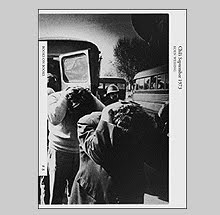How Terry Likes His Coffee by Florian van Roekel

I am not dead and neither is 5B4. I have just been swamped with two months of preparing the next four Errata Editions books to be press-ready for November. Those of you that have published your own books understand how much time and effort goes into their production – try doing four at once. I will announce what they are this coming week.
There is a small stack of books here that I have been wanting to write and now that life is getting more manageable I can get to them. The first is Florian van Roekel’s How Terry Likes His Coffee which I discovered a few months back during the Arles festival.
The book is subtitled: A Photo Odyssey into Office Life. I have never had a desk job, worked 40 hours a week for a paycheck, nor wanted to and I have a strong sense that I wouldn’t be a good fit in such an environment. I believe in the adage Do something you love and you’ll never have to work a day in your life, so it is my hope that there are millions of people out there who love sitting in conference rooms, talking on phones, and passing the hours reading excel documents, otherwise this can get too depressing.
How Terry Likes His Coffee opens with a few pages of white, lined paper upon which people have doodled, perhaps somewhat unconsciously while on the phone or performing some other task that can’t quite take full control of their mind. These pages prepare you for the expected – the staleness of office drudgery. They are hopeful but ultimately fleeting reminders of an alternate dreamlife and the need for an active mind to be stimulated. Coffee might be the other need. The first photograph, as hopeful as the drawings but as sad, describes flaccid balloons and party decorations hanging from a drop ceiling. One balloon is marked with the number 50 and one might suspect these are the remnants of an improvised birthday celebration that will be taken down and thrown away by the office cleaning crew.
That photograph is followed by a few somewhat predictable still lifes of file boxes and water coolers. Things get more interesting for me a couple pages later as Roekel describes suit jackets draped over the backs of chairs. They seem to sway to some unexpected breeze – a flurry of movement disrupting stale air.
The monotony of work, especially in front of computer or while on the phone has been a common theme in photography. One might think of Friedlander’s brilliant repetition of people staring into computer screens which were published as multiplying grids in the catalog Three on Technology from the mid-80s. Roekel engages a similar strategy through repetition, photographing the backs of people’s heads as they go about their assigned tasks, the crispness of his lighting highlights hair-styles as a subtle marker of personality in each person.
The fourth “chapter” for me becomes the most interesting section as Roekel creates facing page diptychs of the workers on the phone. Often nearly identical pictures with only slight difference in the shift of the eyes or hand gestures. The workers are not speaking but listening. Their eyes seem to make clear that they are in the midst of digesting what is being said yet we might read deeper realizations are taking place.
The office space as absurdist comedy has been effectively done before by the likes of Tunbjork and there is a sparseness to this work I like throughout the book. Roekel boils down the images to simple close-ups. There are almost no photos that establish what this business is, nor the layout of the larger space. They keep you focusing on small details for their meaning. They are claustrophobic and the way his artificial light falls off quickly to darkness brings an ominous tone which can be stifling.
The last chapter is a suite of pictures outside of the building where a managed landscape of trees transitions the corporate from the natural. Again Roekel keeps his camera close and doesn’t offer much by way of escape. He photographs the trees much in the same way he photographed the suit jackets – slowly swaying in the silent breeze that has blown through his exposure.
How Terry Like His Coffee was published in an edition of 500 hand-numbered copies.











